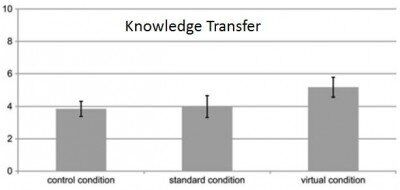Impact of virtual Training Environments on the Acquisition and Transfer of Knowledge
Prof. Dr. Johannes Moskaliuk, Department of Applied Cognitive Psychology and Media Psychology at the University of Tübingen, Prof. Dr. Ulrike Cress and Psychologist Johanna Bertram, Knowledge Construction Lab, Knowledge Media Research Center, Tübingen.
The University of Tübingen, Department of Applied Cognitive Psychology and Media Psychology and the Knowledge Construction Lab, Knowledge Media Research Center Tübingen investigated the use of the virtual learning and work environment ViPOL. ViPOL has been developed for the training of police forces. The results can be transferred to other target groups. The following is a brief overview of the main study results:
The field study compares three training conditions
Virtual training, standard state, control state
Participants | Task
Police officers receive training in communication between ground forces and a helicopter crew during a deployment.
Description
This task (like many other tasks of the police, fire brigade and rescue services) is characterized by high complexity and has no “right” solution. It is based on the specialization of tasks within a team and requires intensive communication between the team members and consists of situations in which people are at risk.
Learning results and knowledge transfer were measured by dependent variables.
Evaluation Item – Knowledge Acquisition
The results confirm that the virtual training in knowledge acquisition was as efficient as the standard training (real conditions).
Evaluation Item – Knowledge Transfer
In terms of knowledge transfer, virtual training was even more efficient than standard training.
Evaluation Item – Training Satisfaction
In terms of training satisfaction, there was no difference between standard and virtual training.


Conclusion
[…] The results provide empirical evidence that virtual training environments are an effective tool for training for complex tasks requiring close collaboration and interaction between team members, which cannot be fully executed under real life conditions.
This is especially useful for when training under real life conditions is not possible, too expensive or too dangerous.
CYBER-2012-0416-ver9-Moskaliuk_1P, Type: research-article, ORIGINAL ARTICLE, CYBERPSYCHOLOGY, BEHAVIOR, AND SOCIAL NETWORKING, 2012, © Mary Ann Liebert, Inc., DOI: 10.1089/cyber.2012.0416


